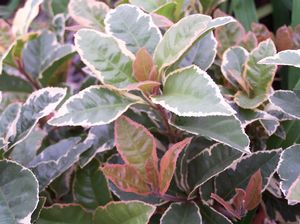View All Plants :: View All BROADLEAF EVERGREEN SHRUBS
Ardisia japonica 'Hakuokan'
Japanese Ardisia
Plant Type:
BROADLEAF EVERGREEN SHRUBSArdisia japonica 'Hakuokan' - Pale pink to white-touched-pink starry flowers open in summer. One-quarter inch red berries adorn this broadleaf evergreen in winter. Birds like the fruits. Simple grayish medium-glossed green leaves have pretty white margins that light up in shade on this beautiful selection. New growth is pinkish adding to interest. Fall foliage picks up bronze infusions on the leathery leaves. This is commonly called Japanese Ardisia and Marlberry. 'Hakuokan' is useful as a groundcover, edging, forward in the foundation between shrubs, rock garden and certainly best employed in a container in the north! Site in part sun to open shade planted in fertile, humus laden acid draining soil. Established pot grown plant.
Please scroll down to Genus Overview for more information...
Characteristics and Attributes for Ardisia japonica 'Hakuokan'
Season of Interest (Flowering)
- Summer
Season of Interest (Foliage)
- Four Seasons
Autumn Interest
- Fruit / Berries / Seed Heads
Nature Attraction
- Songbirds
Light
- Morning Sun / Afternoon Shade
- Shade
- Dappled Shade
Attributes
- Natural Garden
- Ground Cover
- Border
- Foliage
- Potted Plant
- Rock Garden
- Edging
- Woodland
- Evergreen
Growth Rate in the Garden
- Medium
Soil
- Fertile
- Draining
- Humus Laden
- Organic
Origins
- China
- Japan
Propagated By
- Division
Genus Overview: Ardisia
Family: Primulaceae · Common Name: Coralberry, Marlberry
Ardisia japonica, known commonly as Coralberry and Marlberry, is a shrubby, ground covering member of Primulaceae. Numerous species exist from the New World, the Pacific Islands, Australia, Asia with a vast number of species occurring in the tropics. We grow a number of fine selections from the species, A. japonica. These grow from 10 to 16(+) inches tall. Leaves are usually whorled or at least in an opposite template. Late spring flowers are pale pink to white, though small they are quite pretty and are held in racemes. The fruit that follows transforms from green to brilliant red and is persistent. "Berries" can approach the size of a dime and sometimes a little large. They are rounded and look like miniature apples. Ardisia, in its 2,500 year history of Chinese folk medicine, considers Ardisia japonica as one of the 50 fundamental herbs. We generally grow it for its phenomenal ornamental character. They are resplendent as they ground cover in shady, dappled or early morning or late day sun. Late morning to latish afternoon filtered light is important. Fertile, moisture retaining ground is a requirement. The many selections provide delight in their ground covering capacity. Not as well appreciated in U.S. gardens these plants are worthy where they can be grown outdoors. But potted plants allow for close up appreciation for their many merits - 4 season interest for sure - farther north if a cool window, porch, greenhouse or conservatory are part of your domain. USDA climate zones 7 to 9(10).


